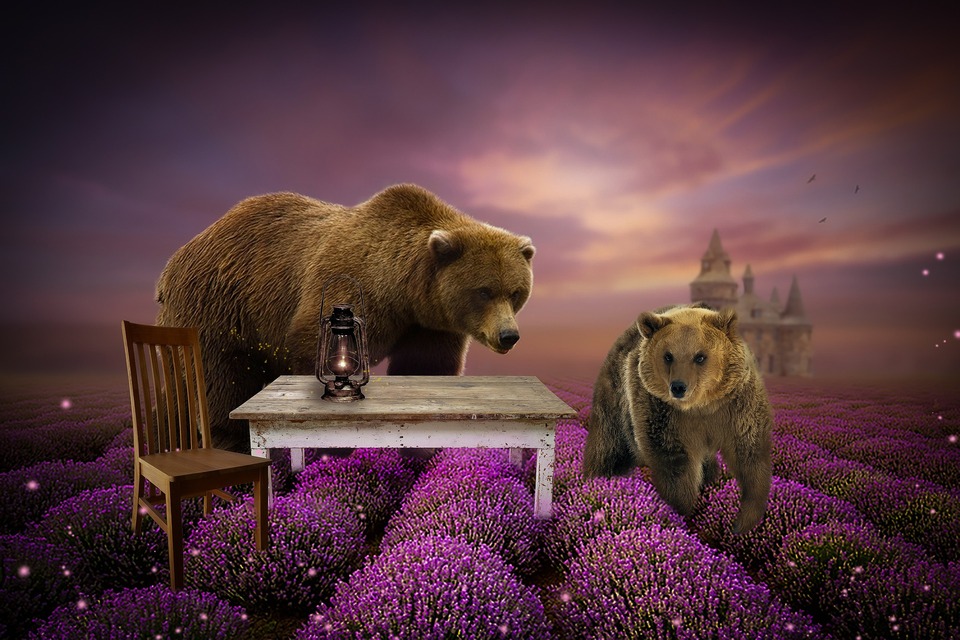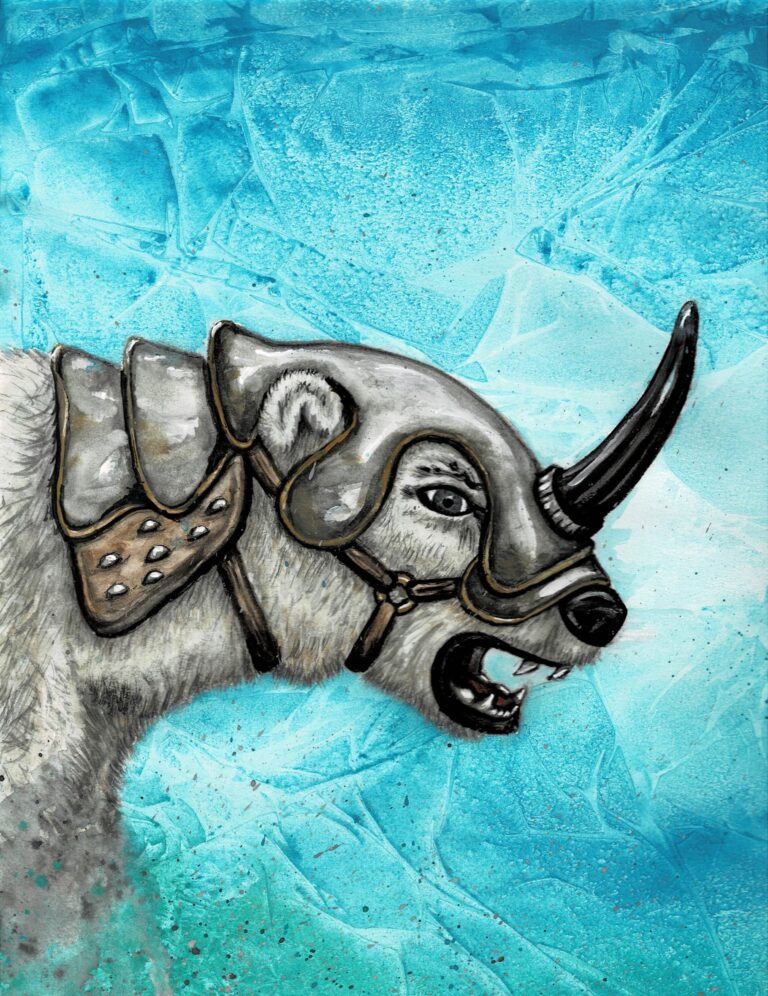Writing Bears into Fantasy
Part 2

In my last post I described some of the physical ways Berardians—the bearfolk of my novel, Hidden Knight—resemble real bears and a few ways they differ. I’m going to continue in this post with what I think are the most interesting aspects of Berardian culture, and how it may be similar to the habits of wild bears, and maybe even more similar to us. (And if you hang on to the end, I’ll give the opening paragraph of my novel.)
🌲🐻❄️🏰
Berardian Culture
Now at this point, I did stray away from real bears because this is fantasy, but I still enjoyed weaving a little real bear stuff in my novel when I could. As I mentioned before, I wanted my bearfolk to truly be bears, and not just folk that “look like bears,” So it was important to me to keep the Berardians as bearlike as I could. However, when it came to culture and customs, this is a fantasy of intelligent bearfolk and not a documentary on wild bears.
Berardians of Adalbern are various shades of brown to black. They lived in peace with humans for 500 years and you might say they are the more “civilized” of the bearfolk. Their population primarily consists of farmers, ranchers, beekeepers, fishers, and merchants. Some are trained soldiers, but all can fight if need be. Their kinfolk of Southern Berardia are large, powerful bears that range from snow white to a light tawny color. Their climate is harsh and cold, and as they’re predominately hunters and fishers, they will readily relocate if necessary to find food. The Southern Berardians don’t have a king, but are organized into three tribes each headed by a lord—and they are not always at peace with each other. The main thing that has kept them at peace with the Kingdom of Adalbern is that they are no match for the combined strength of the human and Berardian armies.
“The Southern Berardians are our kinfolk. It is only right we unify. Why would you side with feeble men and enslave yourself to their proud king, if it be true that he has returned?”
Eirwen remained silent. She should never have told Rut that the King had returned. Still, what Ludolf said made a sort of sense. Whatever Eirwen had heard of Lord Brynmor, could he be worse than a pompous Enoshite king?
“Well, I can see in your eyes it is true. Good, it is better this way. When the Enoshite king is dead, it will end the throne, and all Berardians will unite at my side.”
“Would you murder the King?”
“Murder? This is war and he is the enemy.”
Unlike earth bears, nothing about hibernation is ever mentioned. Since Berardians are an intelligent species, there is no reason they cannot store up provisions for the winter. That’s not to say the Berardians won’t pack on some extra weight, especially in Southern Berardia. Being thin is not a virtue, where it’s often feast or famine. Interestingly, not all true bears hibernate. For example, sun bears and sloth bears of Southeast Asia and spectacled bears of South America live in climates that do not experience seasonal food shortages, making hibernation unnecessary. Since the Berardians of Adalbern live in a moderate climate, it makes sense that they would never have a need to hibernate.
“You’re never going to get as fat as me,” General Argo said, patting his large belly, “if you only stare at your food.”
“I’m not really hungry,” Beau said, setting the honey cake back down. “Actually, I mostly came over ‘cause I wanted to talk to you.”
The general raised a brow. Beau had hardly spoken to him since their argument back in Weldon.
“I’ve been angry with you,” Beau finally said.
“Yes, I’ve been well aware,” said General Argo. “I was belligerent and been drinking a bit much that day back in Weldon. I’ve cut back on the mead.”
“I noticed. But I was angry before our argument. I’d been angry with you and…and the duke for a long time for sending me to Earth.”
“You were angry we brought you back.”
Of bears that do hibernate, it is different sort of hibernation than that of smaller animals. Bears go into a state called torpor, in which they have lower breathing, heart rate, and decreased metabolic rate. Bears in torpor neither eat nor produce waste. Yet, they can be quickly aroused if danger approaches. They might awake to scrounge for food, and mothers awake to birth cubs. However, even among bears that do hibernate, not all necessarily go into torpor. For example, male polar bears might continue to hunt all winter. What is unknown is whether Berardians have this ability to enter torpor if the need ever arose. After all, humans aren’t spending their winters down in Southern Berardia on a ski retreat.
(Also, am I the only one that thinks “torpor” sounds really sci-fi? Like some kind of state Spock would go into? 😂)

You can read more about Hidden Knight: A Novel of a Bear under Books.
As far rearing cubs go, Berardians tend to have smaller families than you might expect, considering that they live about twice as long as humans. Perhaps because there is significantly more energy and resources needed to raise a family. Unlike earth bears, both the father and mother care for the raising of cubs, and the bearfolk’s cubs age much slower. At five years old, Beau, the main character, is still a small enough cub that he is able to be hoisted upon a horse in an emergency. Also, he seems to age at about the same rate as humans, or perhaps even a bit slower. At 18, other Berardians frequently refer to him as a “cub,” showing that in their eyes, he is not yet fully mature.
As the white bear neared, Beau caught a scent he didn’t know how to describe except as distinctly feminine, and he realized with a jolt that the white bear was a female.
“Yes, General?” she replied, removing her helm.
“I have a new trainee for you,” said General Argo. Then turning to Beau, he said, “This is Captain Eirwen.”
The captain approached him uncomfortably close, and spied him critically with icy blue eyes. “Are we recruiting cubs now?” she said. “How old are you?”
Beau took a step back. “Eighteen,” he said shortly, “and I’m not a cub.”
One of my favorite aspects of Berardian culture is the striking division between Southern Berardians and Berardians of Adalbern in their expectations of courtship and marriage. Berardians are practical folk, not given much to romantic notions. That is not to say that love and family are not important to them—quite the contrary. Yet they don’t think of it in the same way humans do. This made for some fun misunderstandings between Beau (who was raised by humans) and Eirwen (whose mother was Southern Berardian and father, a Berardian of Adalbern).
The Southern Berardians continue to hold to the ancient practice of fighting for one’s mate. The male, much like with earth bears, will fight any male challengers to his potential spouse. The fights are not usually, but can be, to the death. The winner thus proves to the female that he is courageous and able to father healthy cubs. Berardians admire strength and courage above all else, and no self-respecting female would wed a coward.
With whetted blades and teeth laid bare
Five Berardians stand tall
She waits their strength to display
For she disdains them all.
~Excerpt from a Southern Berardian ballad
The Berardians of Adalbern strayed away from the ways of their southern kinfolk, at least in part, from the influence of humans. They began to see the folly of violent rituals that might lead to the death of their sons. Their answer was marriages arranged by the fathers of the perspective couple. A couple is usually betrothed while still cubs, but not wed until mature. Since Berardians live well over 100 years, they might not marry till their 30s or 40s. They are expected, during the courtship period, to have ample time to be acquainted and become friends. Berardians are typically very loyal and breaking a betrothal for anything other the most serious reason would be a great insult to the families.
Betrothed two friends young and fair
Slow grew their love through warmth and rain
Waiting for that blessed day
But alas, it never came.
~Excerpt from a Berardian ballad
I think it’s important to note that age differences are of lesser importance among creatures that live up to 160 years. Some beta readers remarked surprise that when their fathers betrothed them, Beau was only 5 and Eirwen 15. Even Eirwen wasn’t too happy about this. But as her father points out, 10 years age difference would become meaningless by the time they were mature enough to wed. And by the time they were old, how much was it going to matter that Beau was 100 and she 110? Nonetheless, Eirwen continued to make jab’s at Beau over his youthfulness…but was that the real reason for her resentment?
She could never forget the day the Azhimen invaded Adalbern. For the first time, she had witnessed her father afraid. When it became evident Weldon would fall, her father had sent her away with one of his units while he went to ensure the heirs were safe. He said they were the hope of Adalbern. How a fat cub and scrawny boy could be the hope of anything had been beyond Eirwen. She could forgive her father for leaving her, but her trust would never be restored. Eirwen became separated from the unit, but escaped with her life and the conviction that she could depend on no one but herself.
Another interesting aspect of Berardian culture is that they do not cry…or do they? All animals shed tears to flush irritants from the eyes and to keep them lubricated, but of course that is different than emotional tears, such as humans use. Certainly, many animals cry from fear and pain, and evidence suggest that some do shed tears. It is said that a baby bear lost from its mother will give a cry that sounds very much like a human baby. And a bear that feels they are about to die may shed tears.
Berardians, however, boast that they do not cry. Certainly, they experience sorrow. As one Berardian said, “Do not confuse my lack of tears for lack of grief.” Even Kelem noted that Beau as a cub “bawled.” Yet, it is believed by the humans of Adalbern that Berardians are incapable of producing tears. The question is whether this is really true, or the “inability” to cry has more to do with culture. Beau, raised on earth by humans and as a human, might be the final proof whether the assertion that Berardians can’t cry is true or not.
And finally, here it is, the opening paragraph of Hidden Knight: A Novel of a Bear:
Kelem peered out from under his thin blanket. The room was dank and ill lit. The fire popped with an angry flare, only to settle back into a low glow as though to concede its efforts were futile, either to light or warm the cavernous room. Beau stirred next to Kelem, but his slow breathing told Kelem he was still asleep. Kelem scowled. How can he sleep after everything? He didn’t even cry. Truthfully, Beau had bawled, but he never shed tears, and to Kelem it just wasn’t the same. Kelem blinked his eyes, but he had run out of tears long ago. There would be no relief for the stinging in his eyes…or his heart.

Pingback: Writing Bears into Fantasy Part 1 - Leanna Rapier
Pingback: Hope Is Found in a Daydream - Leanna Rapier